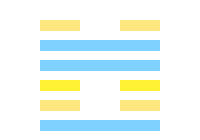Yi Jing Hexagram 50 - Line 4
The hexagram: 50
An hexagram is a combination of six yin and yang lines.

50.4 (50 > 18) - THE TING HEXAGRAM.
The fourth line, undivided, shows the caldron with its feet broken ; and its contents, designed for the ruler's use, overturned and spilt. Its subject will be made to blush for shame. There will be evil.
Bing DeepL Google Yandex50.4 (50 > 18) - Causing damage
One has to repair because one broke something.
Bing DeepL Google Yandex50.4 (50 > 18) - Causing damage
One has to repair because one broke something.
Bing DeepL Google Yandex50.4 (50 > 18) - T’ing, le chaudron
T’ing : chaudron à trois pieds, vase du sacrifice, sacrifice.
Si le chaudron a le pied brisé, les aliments préparés pour le prince sont renversés ; tout l’extérieur en est souillé. (Symbole du manque de fidélité.)
Bing DeepL Google Yandex50.4 (50 > 18) - Causer des dommages
On doit réparer car on a cassé quelque chose.
Bing DeepL Google YandexThe trigrams
The trigrams are combinations of three yin and yang lines. The three bottom lines of the hexagram form the lower trigram and represent the inner situation. The three top lines form the upper trigram and represent the outer situation.
trigSup2


trigInf

The nuclear hexagram: 43.3.5 (43 > 54)
The nuclear hexagram is the association of the two inner trigrams (lines 2,3,4 and 3,4,5). It represents the root, or the origin of the situation.

43.3.5 (43 > 54) - THE KWÂI HEXAGRAM.
- 3. The third line, undivided, shows its subject (about to advance) with strong (and determined) looks. There will be evil. (But) the superior man, bent on cutting off (the criminal), will walk alone and encounter the rain, (till he be hated by his proper associates) as if he were contaminated (by the others). (In the end) there will be no blame against him.
- 5. The fifth line, undivided, shows (the small men like) a bed of purslain, which ought to be uprooted with the utmost determination. (The subject of the line having such determination), his action, in harmony with his central position, will lead to no error or blame.
43.3.5 (43 > 54) - Revelation
One serves others to extract information from them.
Bing DeepL Google Yandex43.3.5 (43 > 54) - Revelation
One serves others to extract information from them.
Bing DeepL Google Yandex43.3.5 (43 > 54) - Kwài, la décision
Kwāi : 1. Rivière divisée en branches ; diviser, couper, disperser ; 2. Décider, régler définitivement, résolu, tranchant ; 3. Habileté, art, prudence.
-
3. Celui qui met sa force dans ses mâchoires* aura malheur. Le sage est résolu, réglé ; partout, il va seul. S’il lui survient des désagréments qui lui attirent la malveillance, il n’en subira aucun résultat fâcheux.
Le sage est résolu, bien réglé, partant il ne se crée pas de regret.
* En ses vantardises. La force, la violence se montre sur son visage.
- 5. Ferme et résolu, comme un mont couvert d’artemisias, suivant le chemin du milieu, on n’aura point de regret.
43.3.5 (43 > 54) - La révélation
On sert les autres pour leur soutirer des informations.
Bing DeepL Google Yandex43.3.5 (43 > 54) - Kinyilatkoztatás
- 3. Eldobja a legkevésbé fontosat.
- 5. A többiek visszatérnek mert nem akarja folytatni.
The derived (Fan Yao)
The same line number on the mutated hexagram. It reperesents what can be done AFTER to correct the situation described by this line, as a sort of remedy or solution.

18.4 (18 > 50) - THE KÛ HEXAGRAM.
The fourth line, divided, shows (a son) viewing indulgently the troubles caused by his father. If he go forward, he will find cause to regret it.
Bing DeepL Google Yandex18.4 (18 > 50) - Failing close to goal
The others do not commit because one has not decided them.
Bing DeepL Google Yandex18.4 (18 > 50) - Failing close to goal
The others do not commit because one has not decided them.
Bing DeepL Google Yandex18.4 (18 > 50) - Kù, l’élimination de la chose pourrie
[color=blue]Kū : délibération, embarras, trouble, soucis.
S’il a une indulgence funeste (pour les défauts de son père) et craint de le troubler (par des remontrances respectueuses), il en aura du regret.
Bing DeepL Google Yandex18.4 (18 > 50) - Échouer près du but
Les autres ne s'engagent pas parce qu'on ne les a pas décidés.
Bing DeepL Google Yandex18.4 (18 > 50) - Rendetlenség
Nem kötelezik el magukat mert nem győzte meg őket.
Bing DeepL Google YandexThe juncture: 17.3
The derived of the reciprocal. It represents what could have been done BEFORE to prevent the situation described by this line, as a sort of remedy or solution.

17.3 (17 > 49) - THE SUI HEXAGRAM.
The third line, divided, shows us one who cleaves to the man of age and experience, and lets go the little boy. Such following will get what it seeks; but it will be advantageous to adhere to what is firm and correct.
Bing DeepL Google Yandex17.3 (17 > 49) - Fostering the most competent
When one prefers the best, the least goes away.
Bing DeepL Google Yandex17.3 (17 > 49) - Fostering the most competent
When one prefers the best, the least goes away.
Bing DeepL Google Yandex17.3 (17 > 49) - Sui, suivre
Sūi : 1. Respect, soumission, conformité à ce qui doit être ; 2. Complaisance ; 3. Fidélité au devoir ; 4. Conséquemment, en ce cas.
S’il fait le contraire*, en ce cas (4e sens, sūi) il arrivera au bien, à la position désirée ; il restera ferme et droit, sa pensée abandonnera toute bassesse.
* Le contraire de 17.2 soit fréquenter les gens âgés (et sages) et laisser de côté les jeunes gens.
17.3 (17 > 49) - Favoriser les plus compétents
Quand on préfère le meilleur, le moins bien s'en va.
Bing DeepL Google Yandex17.3 (17 > 49) - Irányítani
Ha valaki a legjobbat szeretné, a gyenge eltűnik.
Bing DeepL Google YandexThe reciprocal: 49.3
The hexagram upside down. It represents the opposite situation, and as such is insturmental when validating comments.

49.3 (49 > 17) - THE KO HEXAGRAM.
The third line, undivided, shows that action taken by its subject will be evil. Though he be firm and correct, his position is perilous. If the change (he contemplates) have been three times fully discussed, he will be believed in.
Bing DeepL Google Yandex49.3 (49 > 17) - Lacking of adherence
The others do not support the reforms so one withdraws until the doubts are dispelled.
Bing DeepL Google Yandex49.3 (49 > 17) - Lacking of adherence
The others do not support the reforms so one withdraws until the doubts are dispelled.
Bing DeepL Google Yandex49.3 (49 > 17) - Koh, la révolution, la mue
Koh : 1. Peau, cuir, tanner, écorcher ; 2. Changer, différer.
Si l’on corrige le mal, qu’on soit ferme dans les difficultés, et qu’on change de conduite avec mûre délibération, on deviendra juste et ferme.
Bing DeepL Google Yandex49.3 (49 > 17) - Manquer d'adhésion
Les autres ne soutiennent pas les réformes alors on se retire jusqu'à ce que les doutes soient dissipés.
Bing DeepL Google Yandex49.3 (49 > 17) - Vándor
Mások még nincsenek elkötelezve a változások irányába így visszakozik míg a kétségek eloszlanak.
Bing DeepL Google YandexMutations

50.4 (50 > 18) - THE TING HEXAGRAM.
The fourth line, undivided, shows the caldron with its feet broken ; and its contents, designed for the ruler's use, overturned and spilt. Its subject will be made to blush for shame. There will be evil.
Bing DeepL Google Yandex50.4 (50 > 18) - Causing damage
One has to repair because one broke something.
Bing DeepL Google Yandex50.4 (50 > 18) - Causing damage
One has to repair because one broke something.
Bing DeepL Google Yandex50.4 (50 > 18) - T’ing, le chaudron
T’ing : chaudron à trois pieds, vase du sacrifice, sacrifice.
Si le chaudron a le pied brisé, les aliments préparés pour le prince sont renversés ; tout l’extérieur en est souillé. (Symbole du manque de fidélité.)
Bing DeepL Google Yandex50.4 (50 > 18) - Causer des dommages
On doit réparer car on a cassé quelque chose.
Bing DeepL Google Yandex
50.1.4 (50 > 26) - THE TING HEXAGRAM.
- 1. The first line, divided, shows the caldron overthrown and its feet turned up. (But) there will be advantage in its getting rid of what was bad in it. (Or it shows us) the concubine (whose position is improved) by means of her son. There will be no error.
- 4. The fourth line, undivided, shows the caldron with its feet broken ; and its contents, designed for the ruler's use, overturned and spilt. Its subject will be made to blush for shame. There will be evil.
50.1.4 (50 > 26) - Involvement
One has difficulty acclimatising because of the negligence of superiors to take measures in accordance with the requests that one made.
Bing DeepL Google Yandex50.1.4 (50 > 26) - Involvement
One has difficulty acclimatizing because of the negligence of superiors to take measures in accordance with the requests that one made.
Bing DeepL Google Yandex50.1.4 (50 > 26) - T’ing, le chaudron
T’ing : chaudron à trois pieds, vase du sacrifice, sacrifice.
-
1. Quand le chaudron est retourné, on peut aisément en faire tomber ce qui est mauvais (et s’attacher au bien). Une concubine qui a un fils n’aura point de regret d’avoir été prise comme telle.
Note. Nous avons ici deux proverbes signifiant que « le bien peut venir du mal ». Le fils de la concubine peut devenir héritier et, en tout cas, assure une position honorable à sa mère. - 4. Si le chaudron a le pied brisé, les aliments préparés pour le prince sont renversés ; tout l’extérieur en est souillé. (Symbole du manque de fidélité.)
50.1.4 (50 > 26) - L'engagement
On s'acclimate difficilement à cause de la négligence des supérieurs à prendre des mesures conformes aux demandes que l'on a faites.
Bing DeepL Google Yandex50.1.4 (50 > 26) - Bevonás
- 1. Felkészül abból amit mások elrontottak hogy segíthessen rajtuk.
- 4. Meg kell javítania amit eltört.

50.2.4 (50 > 52) - THE TING HEXAGRAM.
- 2. The second line, undivided, shows the caldron with the things (to be cooked) in it. (If its subject can say), ‘My enemy dislikes me, but he cannot approach me,’ there will be good fortune.
- 4. The fourth line, undivided, shows the caldron with its feet broken ; and its contents, designed for the ruler's use, overturned and spilt. Its subject will be made to blush for shame. There will be evil.
50.2.4 (50 > 52) - Involvement
One thinks one knows what to ask, but others will not be satisfied with pointless questions.
Bing DeepL Google Yandex50.2.4 (50 > 52) - Involvement
One thinks one knows what to ask, but others will not be satisfied with pointless questions.
Bing DeepL Google Yandex50.2.4 (50 > 52) - T’ing, le chaudron
T’ing : chaudron à trois pieds, vase du sacrifice, sacrifice.
- 2. Chaudron plein de fruits. — Mon chaudron est plein, mais mon commensal ne peut venir à moi. — Symboles des peines perdues ou d’un cœur vertueux.
- 4. Si le chaudron a le pied brisé, les aliments préparés pour le prince sont renversés ; tout l’extérieur en est souillé. (Symbole du manque de fidélité.)
50.2.4 (50 > 52) - L'engagement
On croit savoir ce qu'il faut demander mais les autres ne seront pas satisfaits avec des questions sans intérêt.
Bing DeepL Google Yandex50.2.4 (50 > 52) - Bevonás
- 2. Sikeresebb társainál mert jobbak az eszközei.
- 4. Meg kell javítania amit eltört.

50.1.2.4 (50 > 22) - THE TING HEXAGRAM.
- 1. The first line, divided, shows the caldron overthrown and its feet turned up. (But) there will be advantage in its getting rid of what was bad in it. (Or it shows us) the concubine (whose position is improved) by means of her son. There will be no error.
- 2. The second line, undivided, shows the caldron with the things (to be cooked) in it. (If its subject can say), ‘My enemy dislikes me, but he cannot approach me,’ there will be good fortune.
- 4. The fourth line, undivided, shows the caldron with its feet broken ; and its contents, designed for the ruler's use, overturned and spilt. Its subject will be made to blush for shame. There will be evil.
50.1.2.4 (50 > 22) - T’ing, le chaudron
T’ing : chaudron à trois pieds, vase du sacrifice, sacrifice.
-
1. Quand le chaudron est retourné, on peut aisément en faire tomber ce qui est mauvais (et s’attacher au bien). Une concubine qui a un fils n’aura point de regret d’avoir été prise comme telle.
Note. Nous avons ici deux proverbes signifiant que « le bien peut venir du mal ». Le fils de la concubine peut devenir héritier et, en tout cas, assure une position honorable à sa mère. - 2. Chaudron plein de fruits. — Mon chaudron est plein, mais mon commensal ne peut venir à moi. — Symboles des peines perdues ou d’un cœur vertueux.
- 4. Si le chaudron a le pied brisé, les aliments préparés pour le prince sont renversés ; tout l’extérieur en est souillé. (Symbole du manque de fidélité.)
50.1.2.4 (50 > 22) - Bevonás
- 1. Felkészül abból amit mások elrontottak hogy segíthessen rajtuk.
- 2. Sikeresebb társainál mert jobbak az eszközei.
- 4. Meg kell javítania amit eltört.

50.3.4 (50 > 4) - THE TING HEXAGRAM.
- 3. The third line, undivided, shows the caldron with (the places of) its ears changed. The progress (of its subject) is (thus) stopped. The fat flesh of the pheasant (which is in the caldron) will not be eaten. But the (genial) rain will come, and the grounds for repentance will disappear. There will be good fortune in the end.
- 4. The fourth line, undivided, shows the caldron with its feet broken ; and its contents, designed for the ruler's use, overturned and spilt. Its subject will be made to blush for shame. There will be evil.
50.3.4 (50 > 4) - Involvement
One gets out of trouble with a bitter taste in the mouth.
Bing DeepL Google Yandex50.3.4 (50 > 4) - Involvement
One gets out of trouble with a bitter taste in the mouth.
Bing DeepL Google Yandex50.3.4 (50 > 4) - T’ing, le chaudron
T’ing : chaudron à trois pieds, vase du sacrifice, sacrifice.
- 3. Si les oreilles du chaudron sont enlevées, son usage est empêché. On ne peut ni le lever, ni l’emporter. — La chair grasse du faisan (qui y cuisait) ne pourra être mangée. Mais une heureuse circonstance survenant dissipera les soucis. (Symbole de malheurs réparés.)
- 4. Si le chaudron a le pied brisé, les aliments préparés pour le prince sont renversés ; tout l’extérieur en est souillé. (Symbole du manque de fidélité.)
50.3.4 (50 > 4) - L'engagement
On sort des ennuis avec un goût amer à la bouche.
Bing DeepL Google Yandex50.3.4 (50 > 4) - Bevonás
- 3. Segítséget kérhet, mert nehéz a többiek nélkül keresni.
- 4. Meg kell javítania amit eltört.

50.1.3.4 (50 > 41) - THE TING HEXAGRAM.
- 1. The first line, divided, shows the caldron overthrown and its feet turned up. (But) there will be advantage in its getting rid of what was bad in it. (Or it shows us) the concubine (whose position is improved) by means of her son. There will be no error.
- 3. The third line, undivided, shows the caldron with (the places of) its ears changed. The progress (of its subject) is (thus) stopped. The fat flesh of the pheasant (which is in the caldron) will not be eaten. But the (genial) rain will come, and the grounds for repentance will disappear. There will be good fortune in the end.
- 4. The fourth line, undivided, shows the caldron with its feet broken ; and its contents, designed for the ruler's use, overturned and spilt. Its subject will be made to blush for shame. There will be evil.
50.1.3.4 (50 > 41) - Involvement
One shambles so as not to leave too quickly.
Bing DeepL Google Yandex50.1.3.4 (50 > 41) - Involvement
One shambles so as not to leave too quickly.
Bing DeepL Google Yandex50.1.3.4 (50 > 41) - T’ing, le chaudron
T’ing : chaudron à trois pieds, vase du sacrifice, sacrifice.
-
1. Quand le chaudron est retourné, on peut aisément en faire tomber ce qui est mauvais (et s’attacher au bien). Une concubine qui a un fils n’aura point de regret d’avoir été prise comme telle.
Note. Nous avons ici deux proverbes signifiant que « le bien peut venir du mal ». Le fils de la concubine peut devenir héritier et, en tout cas, assure une position honorable à sa mère. - 3. Si les oreilles du chaudron sont enlevées, son usage est empêché. On ne peut ni le lever, ni l’emporter. — La chair grasse du faisan (qui y cuisait) ne pourra être mangée. Mais une heureuse circonstance survenant dissipera les soucis. (Symbole de malheurs réparés.)
- 4. Si le chaudron a le pied brisé, les aliments préparés pour le prince sont renversés ; tout l’extérieur en est souillé. (Symbole du manque de fidélité.)
50.1.3.4 (50 > 41) - L'engagement
On traîne des pieds pour ne pas partir trop vite.
Bing DeepL Google Yandex50.1.3.4 (50 > 41) - Bevonás
- 1. Felkészül abból amit mások elrontottak hogy segíthessen rajtuk.
- 3. Segítséget kérhet, mert nehéz a többiek nélkül keresni.
- 4. Meg kell javítania amit eltört.

50.2.3.4 (50 > 23) - THE TING HEXAGRAM.
- 2. The second line, undivided, shows the caldron with the things (to be cooked) in it. (If its subject can say), ‘My enemy dislikes me, but he cannot approach me,’ there will be good fortune.
- 3. The third line, undivided, shows the caldron with (the places of) its ears changed. The progress (of its subject) is (thus) stopped. The fat flesh of the pheasant (which is in the caldron) will not be eaten. But the (genial) rain will come, and the grounds for repentance will disappear. There will be good fortune in the end.
- 4. The fourth line, undivided, shows the caldron with its feet broken ; and its contents, designed for the ruler's use, overturned and spilt. Its subject will be made to blush for shame. There will be evil.
50.2.3.4 (50 > 23) - Involvement
One spends peaceful days waiting to be summoned by those who need backup.
Bing DeepL Google Yandex50.2.3.4 (50 > 23) - Involvement
One spends peaceful days waiting to be summoned by those who need backup.
Bing DeepL Google Yandex50.2.3.4 (50 > 23) - T’ing, le chaudron
T’ing : chaudron à trois pieds, vase du sacrifice, sacrifice.
- 2. Chaudron plein de fruits. — Mon chaudron est plein, mais mon commensal ne peut venir à moi. — Symboles des peines perdues ou d’un cœur vertueux.
- 3. Si les oreilles du chaudron sont enlevées, son usage est empêché. On ne peut ni le lever, ni l’emporter. — La chair grasse du faisan (qui y cuisait) ne pourra être mangée. Mais une heureuse circonstance survenant dissipera les soucis. (Symbole de malheurs réparés.)
- 4. Si le chaudron a le pied brisé, les aliments préparés pour le prince sont renversés ; tout l’extérieur en est souillé. (Symbole du manque de fidélité.)
50.2.3.4 (50 > 23) - L'engagement
On coule des jours paisibles en attendant d'être convoqué par ceux qui ont besoin de renforts.
Bing DeepL Google Yandex50.2.3.4 (50 > 23) - Bevonás
- 2. Sikeresebb társainál mert jobbak az eszközei.
- 3. Segítséget kérhet, mert nehéz a többiek nélkül keresni.
- 4. Meg kell javítania amit eltört.

50.1.2.3.4 (50 > 27) - THE TING HEXAGRAM.
- 1. The first line, divided, shows the caldron overthrown and its feet turned up. (But) there will be advantage in its getting rid of what was bad in it. (Or it shows us) the concubine (whose position is improved) by means of her son. There will be no error.
- 2. The second line, undivided, shows the caldron with the things (to be cooked) in it. (If its subject can say), ‘My enemy dislikes me, but he cannot approach me,’ there will be good fortune.
- 3. The third line, undivided, shows the caldron with (the places of) its ears changed. The progress (of its subject) is (thus) stopped. The fat flesh of the pheasant (which is in the caldron) will not be eaten. But the (genial) rain will come, and the grounds for repentance will disappear. There will be good fortune in the end.
- 4. The fourth line, undivided, shows the caldron with its feet broken ; and its contents, designed for the ruler's use, overturned and spilt. Its subject will be made to blush for shame. There will be evil.
50.1.2.3.4 (50 > 27) - Involvement
One prepares the succession by showing others what one has done.
Bing DeepL Google Yandex50.1.2.3.4 (50 > 27) - Involvement
One prepares the succession by showing others what one has done.
Bing DeepL Google Yandex50.1.2.3.4 (50 > 27) - T’ing, le chaudron
T’ing : chaudron à trois pieds, vase du sacrifice, sacrifice.
-
1. Quand le chaudron est retourné, on peut aisément en faire tomber ce qui est mauvais (et s’attacher au bien). Une concubine qui a un fils n’aura point de regret d’avoir été prise comme telle.
Note. Nous avons ici deux proverbes signifiant que « le bien peut venir du mal ». Le fils de la concubine peut devenir héritier et, en tout cas, assure une position honorable à sa mère. - 2. Chaudron plein de fruits. — Mon chaudron est plein, mais mon commensal ne peut venir à moi. — Symboles des peines perdues ou d’un cœur vertueux.
- 3. Si les oreilles du chaudron sont enlevées, son usage est empêché. On ne peut ni le lever, ni l’emporter. — La chair grasse du faisan (qui y cuisait) ne pourra être mangée. Mais une heureuse circonstance survenant dissipera les soucis. (Symbole de malheurs réparés.)
- 4. Si le chaudron a le pied brisé, les aliments préparés pour le prince sont renversés ; tout l’extérieur en est souillé. (Symbole du manque de fidélité.)
50.1.2.3.4 (50 > 27) - L'engagement
On prépare la relève en montrant aux autres ce qu'on a fait.
Bing DeepL Google Yandex50.1.2.3.4 (50 > 27) - Bevonás
- 1. Felkészül abból amit mások elrontottak hogy segíthessen rajtuk.
- 2. Sikeresebb társainál mert jobbak az eszközei.
- 3. Segítséget kérhet, mert nehéz a többiek nélkül keresni.
- 4. Meg kell javítania amit eltört.

50.4.5 (50 > 57) - THE TING HEXAGRAM.
- 4. The fourth line, undivided, shows the caldron with its feet broken ; and its contents, designed for the ruler's use, overturned and spilt. Its subject will be made to blush for shame. There will be evil.
- 5. The fifth line, divided, shows the caldron with yellow ears and rings of metal in them. There will be advantage through being firm and correct.
50.4.5 (50 > 57) - Involvement
One contemplates one' s feet while waiting for the mistake to be noticed.
Bing DeepL Google Yandex50.4.5 (50 > 57) - Involvement
One contemplates one' s feet while waiting for the mistake to be noticed.
Bing DeepL Google Yandex50.4.5 (50 > 57) - T’ing, le chaudron
T’ing : chaudron à trois pieds, vase du sacrifice, sacrifice.
- 4. Si le chaudron a le pied brisé, les aliments préparés pour le prince sont renversés ; tout l’extérieur en est souillé. (Symbole du manque de fidélité.)
- 5. Un chaudron aux oreilles, aux anneaux d’or, représente la prospérité venant de la fidélité.
50.4.5 (50 > 57) - L'engagement
On contemple ses pieds en attendant que la bêtise soit remarquée.
Bing DeepL Google Yandex50.4.5 (50 > 57) - Bevonás
- 4. Meg kell javítania amit eltört.
- 5. Készen áll hogy segítsen.

50.1.4.5 (50 > 9) - THE TING HEXAGRAM.
- 1. The first line, divided, shows the caldron overthrown and its feet turned up. (But) there will be advantage in its getting rid of what was bad in it. (Or it shows us) the concubine (whose position is improved) by means of her son. There will be no error.
- 4. The fourth line, undivided, shows the caldron with its feet broken ; and its contents, designed for the ruler's use, overturned and spilt. Its subject will be made to blush for shame. There will be evil.
- 5. The fifth line, divided, shows the caldron with yellow ears and rings of metal in them. There will be advantage through being firm and correct.
50.1.4.5 (50 > 9) - Telling one's discomfort before deciding one's commitment
One wants to know if the close relations have rejected the extreme choices before committing oneself to their side.
Bing DeepL Google Yandex50.1.4.5 (50 > 9) - Telling one's discomfort before deciding one's commitment
One wants to know if the close relations have rejected the extreme choices before committing oneself to their side.
Bing DeepL Google Yandex50.1.4.5 (50 > 9) - T’ing, le chaudron
T’ing : chaudron à trois pieds, vase du sacrifice, sacrifice.
-
1. Quand le chaudron est retourné, on peut aisément en faire tomber ce qui est mauvais (et s’attacher au bien). Une concubine qui a un fils n’aura point de regret d’avoir été prise comme telle.
Note. Nous avons ici deux proverbes signifiant que « le bien peut venir du mal ». Le fils de la concubine peut devenir héritier et, en tout cas, assure une position honorable à sa mère. - 4. Si le chaudron a le pied brisé, les aliments préparés pour le prince sont renversés ; tout l’extérieur en est souillé. (Symbole du manque de fidélité.)
- 5. Un chaudron aux oreilles, aux anneaux d’or, représente la prospérité venant de la fidélité.
50.1.4.5 (50 > 9) - Dire sa gêne avant de décider de son engagement
On veut savoir si les proches ont écarté les choix extrêmes avant de s’engager à leur côté.
Bing DeepL Google Yandex50.1.4.5 (50 > 9) - Bevonás
- 1. Felkészül abból amit mások elrontottak hogy segíthessen rajtuk.
- 4. Meg kell javítania amit eltört.
- 5. Készen áll hogy segítsen.

50.2.4.5 (50 > 53) - THE TING HEXAGRAM.
- 2. The second line, undivided, shows the caldron with the things (to be cooked) in it. (If its subject can say), ‘My enemy dislikes me, but he cannot approach me,’ there will be good fortune.
- 4. The fourth line, undivided, shows the caldron with its feet broken ; and its contents, designed for the ruler's use, overturned and spilt. Its subject will be made to blush for shame. There will be evil.
- 5. The fifth line, divided, shows the caldron with yellow ears and rings of metal in them. There will be advantage through being firm and correct.
50.2.4.5 (50 > 53) - Involvement
One is confronted with a cruel dilemma that can only be resolved by a comprehensive study.
50.2.4.5 (50 > 53) - Involvement
One is confronted with a cruel dilemma that can only be resolved by a comprehensive study.
50.2.4.5 (50 > 53) - T’ing, le chaudron
T’ing : chaudron à trois pieds, vase du sacrifice, sacrifice.
- 2. Chaudron plein de fruits. — Mon chaudron est plein, mais mon commensal ne peut venir à moi. — Symboles des peines perdues ou d’un cœur vertueux.
- 4. Si le chaudron a le pied brisé, les aliments préparés pour le prince sont renversés ; tout l’extérieur en est souillé. (Symbole du manque de fidélité.)
- 5. Un chaudron aux oreilles, aux anneaux d’or, représente la prospérité venant de la fidélité.
50.2.4.5 (50 > 53) - L'engagement
On se retrouve en face d'un cruel dilemme que seule pourra résoudre une étude approfondie.
Bing DeepL Google Yandex50.2.4.5 (50 > 53) - Bevonás
- 2. Sikeresebb társainál mert jobbak az eszközei.
- 4. Meg kell javítania amit eltört.
- 5. Készen áll hogy segítsen.

50.1.2.4.5 (50 > 37) - THE TING HEXAGRAM.
- 1. The first line, divided, shows the caldron overthrown and its feet turned up. (But) there will be advantage in its getting rid of what was bad in it. (Or it shows us) the concubine (whose position is improved) by means of her son. There will be no error.
- 2. The second line, undivided, shows the caldron with the things (to be cooked) in it. (If its subject can say), ‘My enemy dislikes me, but he cannot approach me,’ there will be good fortune.
- 4. The fourth line, undivided, shows the caldron with its feet broken ; and its contents, designed for the ruler's use, overturned and spilt. Its subject will be made to blush for shame. There will be evil.
- 5. The fifth line, divided, shows the caldron with yellow ears and rings of metal in them. There will be advantage through being firm and correct.
50.1.2.4.5 (50 > 37) - Involvement
One stops his presentation when others are not attentive.
Bing DeepL Google Yandex50.1.2.4.5 (50 > 37) - Involvement
One stops his presentation when others are not attentive.
Bing DeepL Google Yandex50.1.2.4.5 (50 > 37) - T’ing, le chaudron
T’ing : chaudron à trois pieds, vase du sacrifice, sacrifice.
-
1. Quand le chaudron est retourné, on peut aisément en faire tomber ce qui est mauvais (et s’attacher au bien). Une concubine qui a un fils n’aura point de regret d’avoir été prise comme telle.
Note. Nous avons ici deux proverbes signifiant que « le bien peut venir du mal ». Le fils de la concubine peut devenir héritier et, en tout cas, assure une position honorable à sa mère. - 2. Chaudron plein de fruits. — Mon chaudron est plein, mais mon commensal ne peut venir à moi. — Symboles des peines perdues ou d’un cœur vertueux.
- 4. Si le chaudron a le pied brisé, les aliments préparés pour le prince sont renversés ; tout l’extérieur en est souillé. (Symbole du manque de fidélité.)
- 5. Un chaudron aux oreilles, aux anneaux d’or, représente la prospérité venant de la fidélité.
50.1.2.4.5 (50 > 37) - L'engagement
On arrête sa présentation quand les autres ne sont pas attentifs.
Bing DeepL Google Yandex50.1.2.4.5 (50 > 37) - Bevonás
- 1. Felkészül abból amit mások elrontottak hogy segíthessen rajtuk.
- 2. Sikeresebb társainál mert jobbak az eszközei.
- 4. Meg kell javítania amit eltört.
- 5. Készen áll hogy segítsen.

50.3.4.5 (50 > 59) - THE TING HEXAGRAM.
- 3. The third line, undivided, shows the caldron with (the places of) its ears changed. The progress (of its subject) is (thus) stopped. The fat flesh of the pheasant (which is in the caldron) will not be eaten. But the (genial) rain will come, and the grounds for repentance will disappear. There will be good fortune in the end.
- 4. The fourth line, undivided, shows the caldron with its feet broken ; and its contents, designed for the ruler's use, overturned and spilt. Its subject will be made to blush for shame. There will be evil.
- 5. The fifth line, divided, shows the caldron with yellow ears and rings of metal in them. There will be advantage through being firm and correct.
50.3.4.5 (50 > 59) - Involvement
One sends one's opponents to the changing rooms because they didn't know how to behave properly.
Bing DeepL Google Yandex50.3.4.5 (50 > 59) - Involvement
One sends one's opponents to the changing rooms because they didn't know how to behave properly.
Bing DeepL Google Yandex50.3.4.5 (50 > 59) - T’ing, le chaudron
T’ing : chaudron à trois pieds, vase du sacrifice, sacrifice.
- 3. Si les oreilles du chaudron sont enlevées, son usage est empêché. On ne peut ni le lever, ni l’emporter. — La chair grasse du faisan (qui y cuisait) ne pourra être mangée. Mais une heureuse circonstance survenant dissipera les soucis. (Symbole de malheurs réparés.)
- 4. Si le chaudron a le pied brisé, les aliments préparés pour le prince sont renversés ; tout l’extérieur en est souillé. (Symbole du manque de fidélité.)
- 5. Un chaudron aux oreilles, aux anneaux d’or, représente la prospérité venant de la fidélité.
50.3.4.5 (50 > 59) - L'engagement
On envoie ses adversaires aux vestiaires car ils n'ont pas su se tenir correctement.
Bing DeepL Google Yandex50.3.4.5 (50 > 59) - Bevonás
- 3. Segítséget kérhet, mert nehéz a többiek nélkül keresni.
- 4. Meg kell javítania amit eltört.
- 5. Készen áll hogy segítsen.

50.1.3.4.5 (50 > 61) - THE TING HEXAGRAM.
- 1. The first line, divided, shows the caldron overthrown and its feet turned up. (But) there will be advantage in its getting rid of what was bad in it. (Or it shows us) the concubine (whose position is improved) by means of her son. There will be no error.
- 3. The third line, undivided, shows the caldron with (the places of) its ears changed. The progress (of its subject) is (thus) stopped. The fat flesh of the pheasant (which is in the caldron) will not be eaten. But the (genial) rain will come, and the grounds for repentance will disappear. There will be good fortune in the end.
- 4. The fourth line, undivided, shows the caldron with its feet broken ; and its contents, designed for the ruler's use, overturned and spilt. Its subject will be made to blush for shame. There will be evil.
- 5. The fifth line, divided, shows the caldron with yellow ears and rings of metal in them. There will be advantage through being firm and correct.
50.1.3.4.5 (50 > 61) - Involvement
One loses one's grip on one' s entourage because of a blunder that has raised doubts.
Bing DeepL Google Yandex50.1.3.4.5 (50 > 61) - Involvement
One loses one's grip on one' s entourage because of a blunder that has raised doubts.
Bing DeepL Google Yandex50.1.3.4.5 (50 > 61) - T’ing, le chaudron
T’ing : chaudron à trois pieds, vase du sacrifice, sacrifice.
-
1. Quand le chaudron est retourné, on peut aisément en faire tomber ce qui est mauvais (et s’attacher au bien). Une concubine qui a un fils n’aura point de regret d’avoir été prise comme telle.
Note. Nous avons ici deux proverbes signifiant que « le bien peut venir du mal ». Le fils de la concubine peut devenir héritier et, en tout cas, assure une position honorable à sa mère. - 3. Si les oreilles du chaudron sont enlevées, son usage est empêché. On ne peut ni le lever, ni l’emporter. — La chair grasse du faisan (qui y cuisait) ne pourra être mangée. Mais une heureuse circonstance survenant dissipera les soucis. (Symbole de malheurs réparés.)
- 4. Si le chaudron a le pied brisé, les aliments préparés pour le prince sont renversés ; tout l’extérieur en est souillé. (Symbole du manque de fidélité.)
- 5. Un chaudron aux oreilles, aux anneaux d’or, représente la prospérité venant de la fidélité.
50.1.3.4.5 (50 > 61) - L'engagement
On perd son emprise sur son entourage à cause d'une maladresse qui a semé le doute.
Bing DeepL Google Yandex50.1.3.4.5 (50 > 61) - Bevonás
- 1. Felkészül abból amit mások elrontottak hogy segíthessen rajtuk.
- 3. Segítséget kérhet, mert nehéz a többiek nélkül keresni.
- 4. Meg kell javítania amit eltört.
- 5. Készen áll hogy segítsen.

50.2.3.4.5 (50 > 20) - THE TING HEXAGRAM.
- 2. The second line, undivided, shows the caldron with the things (to be cooked) in it. (If its subject can say), ‘My enemy dislikes me, but he cannot approach me,’ there will be good fortune.
- 3. The third line, undivided, shows the caldron with (the places of) its ears changed. The progress (of its subject) is (thus) stopped. The fat flesh of the pheasant (which is in the caldron) will not be eaten. But the (genial) rain will come, and the grounds for repentance will disappear. There will be good fortune in the end.
- 4. The fourth line, undivided, shows the caldron with its feet broken ; and its contents, designed for the ruler's use, overturned and spilt. Its subject will be made to blush for shame. There will be evil.
- 5. The fifth line, divided, shows the caldron with yellow ears and rings of metal in them. There will be advantage through being firm and correct.
50.2.3.4.5 (50 > 20) - Involvement
One refuses to let other competitors in until the game is over.
Bing DeepL Google Yandex50.2.3.4.5 (50 > 20) - Involvement
One refuses to let other competitors in until the game is over.
Bing DeepL Google Yandex50.2.3.4.5 (50 > 20) - T’ing, le chaudron
T’ing : chaudron à trois pieds, vase du sacrifice, sacrifice.
- 2. Chaudron plein de fruits. — Mon chaudron est plein, mais mon commensal ne peut venir à moi. — Symboles des peines perdues ou d’un cœur vertueux.
- 3. Si les oreilles du chaudron sont enlevées, son usage est empêché. On ne peut ni le lever, ni l’emporter. — La chair grasse du faisan (qui y cuisait) ne pourra être mangée. Mais une heureuse circonstance survenant dissipera les soucis. (Symbole de malheurs réparés.)
- 4. Si le chaudron a le pied brisé, les aliments préparés pour le prince sont renversés ; tout l’extérieur en est souillé. (Symbole du manque de fidélité.)
- 5. Un chaudron aux oreilles, aux anneaux d’or, représente la prospérité venant de la fidélité.
50.2.3.4.5 (50 > 20) - L'engagement
On refuse de voir arriver d'autres compétiteurs tant que la partie n'est pas achevée.
Bing DeepL Google Yandex50.2.3.4.5 (50 > 20) - Bevonás
- 2. Sikeresebb társainál mert jobbak az eszközei.
- 3. Segítséget kérhet, mert nehéz a többiek nélkül keresni.
- 4. Meg kell javítania amit eltört.
- 5. Készen áll hogy segítsen.

50.1.2.3.4.5 (50 > 42) - THE TING HEXAGRAM.
- 1. The first line, divided, shows the caldron overthrown and its feet turned up. (But) there will be advantage in its getting rid of what was bad in it. (Or it shows us) the concubine (whose position is improved) by means of her son. There will be no error.
- 2. The second line, undivided, shows the caldron with the things (to be cooked) in it. (If its subject can say), ‘My enemy dislikes me, but he cannot approach me,’ there will be good fortune.
- 3. The third line, undivided, shows the caldron with (the places of) its ears changed. The progress (of its subject) is (thus) stopped. The fat flesh of the pheasant (which is in the caldron) will not be eaten. But the (genial) rain will come, and the grounds for repentance will disappear. There will be good fortune in the end.
- 4. The fourth line, undivided, shows the caldron with its feet broken ; and its contents, designed for the ruler's use, overturned and spilt. Its subject will be made to blush for shame. There will be evil.
- 5. The fifth line, divided, shows the caldron with yellow ears and rings of metal in them. There will be advantage through being firm and correct.
50.1.2.3.4.5 (50 > 42) - Involvement
One must be taken care of to avoid isolation.
Bing DeepL Google Yandex50.1.2.3.4.5 (50 > 42) - Involvement
One must be taken care of to avoid isolation.
Bing DeepL Google Yandex50.1.2.3.4.5 (50 > 42) - T’ing, le chaudron
T’ing : chaudron à trois pieds, vase du sacrifice, sacrifice.
-
1. Quand le chaudron est retourné, on peut aisément en faire tomber ce qui est mauvais (et s’attacher au bien). Une concubine qui a un fils n’aura point de regret d’avoir été prise comme telle.
Note. Nous avons ici deux proverbes signifiant que « le bien peut venir du mal ». Le fils de la concubine peut devenir héritier et, en tout cas, assure une position honorable à sa mère. - 2. Chaudron plein de fruits. — Mon chaudron est plein, mais mon commensal ne peut venir à moi. — Symboles des peines perdues ou d’un cœur vertueux.
- 3. Si les oreilles du chaudron sont enlevées, son usage est empêché. On ne peut ni le lever, ni l’emporter. — La chair grasse du faisan (qui y cuisait) ne pourra être mangée. Mais une heureuse circonstance survenant dissipera les soucis. (Symbole de malheurs réparés.)
- 4. Si le chaudron a le pied brisé, les aliments préparés pour le prince sont renversés ; tout l’extérieur en est souillé. (Symbole du manque de fidélité.)
- 5. Un chaudron aux oreilles, aux anneaux d’or, représente la prospérité venant de la fidélité.
50.1.2.3.4.5 (50 > 42) - L'engagement
On doit se faire prendre en charge pour éviter l'isolement.
Bing DeepL Google Yandex50.1.2.3.4.5 (50 > 42) - Bevonás
- 1. Felkészül abból amit mások elrontottak hogy segíthessen rajtuk.
- 2. Sikeresebb társainál mert jobbak az eszközei.
- 3. Segítséget kérhet, mert nehéz a többiek nélkül keresni.
- 4. Meg kell javítania amit eltört.
- 5. Készen áll hogy segítsen.

50.4.6 (50 > 46) - THE TING HEXAGRAM.
- 4. The fourth line, undivided, shows the caldron with its feet broken ; and its contents, designed for the ruler's use, overturned and spilt. Its subject will be made to blush for shame. There will be evil.
- 6. The sixth line, undivided, shows the caldron with rings of jade. There will be great good for- tune, and all action taken will be in every way advantageous.
50.4.6 (50 > 46) - Putting an end to regrets
One addresses the question without interest for the solution.
Bing DeepL Google Yandex50.4.6 (50 > 46) - Putting an end to regrets
One addresses the question without interest for the solution.
Bing DeepL Google Yandex50.4.6 (50 > 46) - T’ing, le chaudron
T’ing : chaudron à trois pieds, vase du sacrifice, sacrifice.
- 4. Si le chaudron a le pied brisé, les aliments préparés pour le prince sont renversés ; tout l’extérieur en est souillé. (Symbole du manque de fidélité.)
- 6. Un chaudron aux anneaux de jade représente une grande prospérité, pour qui tout est avantage. Elle arrive quand le fort et le faible observent la mesure.
50.4.6 (50 > 46) - En finir avec les regrets
On se penche sur la question sans intérêt pour la solution.
Bing DeepL Google Yandex50.4.6 (50 > 46) - Bevonás
- 4. Meg kell javítania amit eltört.
- 6. Visszatér a munkához hogy segítsen társainak.

50.1.4.6 (50 > 11) - THE TING HEXAGRAM.
- 1. The first line, divided, shows the caldron overthrown and its feet turned up. (But) there will be advantage in its getting rid of what was bad in it. (Or it shows us) the concubine (whose position is improved) by means of her son. There will be no error.
- 4. The fourth line, undivided, shows the caldron with its feet broken ; and its contents, designed for the ruler's use, overturned and spilt. Its subject will be made to blush for shame. There will be evil.
- 6. The sixth line, undivided, shows the caldron with rings of jade. There will be great good for- tune, and all action taken will be in every way advantageous.
50.1.4.6 (50 > 11) - Involvement
Before leaving, one has to think about telling one's friends how long one plans to be away.
Bing DeepL Google Yandex50.1.4.6 (50 > 11) - Involvement
Before leaving, one has to think about telling one's friends how long one plans to be away.
Bing DeepL Google Yandex50.1.4.6 (50 > 11) - T’ing, le chaudron
T’ing : chaudron à trois pieds, vase du sacrifice, sacrifice.
-
1. Quand le chaudron est retourné, on peut aisément en faire tomber ce qui est mauvais (et s’attacher au bien). Une concubine qui a un fils n’aura point de regret d’avoir été prise comme telle.
Note. Nous avons ici deux proverbes signifiant que « le bien peut venir du mal ». Le fils de la concubine peut devenir héritier et, en tout cas, assure une position honorable à sa mère. - 4. Si le chaudron a le pied brisé, les aliments préparés pour le prince sont renversés ; tout l’extérieur en est souillé. (Symbole du manque de fidélité.)
- 6. Un chaudron aux anneaux de jade représente une grande prospérité, pour qui tout est avantage. Elle arrive quand le fort et le faible observent la mesure.
50.1.4.6 (50 > 11) - L'engagement
Avant de partir, on pense à dire à ses amis combien de temps on compte s'absenter.
Bing DeepL Google Yandex50.1.4.6 (50 > 11) - Bevonás
- 1. Felkészül abból amit mások elrontottak hogy segíthessen rajtuk.
- 4. Meg kell javítania amit eltört.
- 6. Visszatér a munkához hogy segítsen társainak.

50.2.4.6 (50 > 15) - THE TING HEXAGRAM.
- 2. The second line, undivided, shows the caldron with the things (to be cooked) in it. (If its subject can say), ‘My enemy dislikes me, but he cannot approach me,’ there will be good fortune.
- 4. The fourth line, undivided, shows the caldron with its feet broken ; and its contents, designed for the ruler's use, overturned and spilt. Its subject will be made to blush for shame. There will be evil.
- 6. The sixth line, undivided, shows the caldron with rings of jade. There will be great good for- tune, and all action taken will be in every way advantageous.
50.2.4.6 (50 > 15) - Involvement
One drives away a mercenary who wanted to benefit from the opportunity.
Bing DeepL Google Yandex50.2.4.6 (50 > 15) - Involvement
One drives away a mercenary who wanted to benefit from the opportunity.
Bing DeepL Google Yandex50.2.4.6 (50 > 15) - T’ing, le chaudron
T’ing : chaudron à trois pieds, vase du sacrifice, sacrifice.
- 2. Chaudron plein de fruits. — Mon chaudron est plein, mais mon commensal ne peut venir à moi. — Symboles des peines perdues ou d’un cœur vertueux.
- 4. Si le chaudron a le pied brisé, les aliments préparés pour le prince sont renversés ; tout l’extérieur en est souillé. (Symbole du manque de fidélité.)
- 6. Un chaudron aux anneaux de jade représente une grande prospérité, pour qui tout est avantage. Elle arrive quand le fort et le faible observent la mesure.
50.2.4.6 (50 > 15) - L'engagement
On éloigne un mercenaire qui voulait profiter de l'occasion.
Bing DeepL Google Yandex50.2.4.6 (50 > 15) - Bevonás
- 2. Sikeresebb társainál mert jobbak az eszközei.
- 4. Meg kell javítania amit eltört.
- 6. Visszatér a munkához hogy segítsen társainak.

50.1.2.4.6 (50 > 36) - THE TING HEXAGRAM.
- 1. The first line, divided, shows the caldron overthrown and its feet turned up. (But) there will be advantage in its getting rid of what was bad in it. (Or it shows us) the concubine (whose position is improved) by means of her son. There will be no error.
- 2. The second line, undivided, shows the caldron with the things (to be cooked) in it. (If its subject can say), ‘My enemy dislikes me, but he cannot approach me,’ there will be good fortune.
- 4. The fourth line, undivided, shows the caldron with its feet broken ; and its contents, designed for the ruler's use, overturned and spilt. Its subject will be made to blush for shame. There will be evil.
- 6. The sixth line, undivided, shows the caldron with rings of jade. There will be great good for- tune, and all action taken will be in every way advantageous.
50.1.2.4.6 (50 > 36) - Involvement
One is locked up with those who wanted to commit reprehensible acts.
Bing DeepL Google Yandex50.1.2.4.6 (50 > 36) - Involvement
One is locked up with those who wanted to commit reprehensible acts.
Bing DeepL Google Yandex50.1.2.4.6 (50 > 36) - T’ing, le chaudron
T’ing : chaudron à trois pieds, vase du sacrifice, sacrifice.
-
1. Quand le chaudron est retourné, on peut aisément en faire tomber ce qui est mauvais (et s’attacher au bien). Une concubine qui a un fils n’aura point de regret d’avoir été prise comme telle.
Note. Nous avons ici deux proverbes signifiant que « le bien peut venir du mal ». Le fils de la concubine peut devenir héritier et, en tout cas, assure une position honorable à sa mère. - 2. Chaudron plein de fruits. — Mon chaudron est plein, mais mon commensal ne peut venir à moi. — Symboles des peines perdues ou d’un cœur vertueux.
- 4. Si le chaudron a le pied brisé, les aliments préparés pour le prince sont renversés ; tout l’extérieur en est souillé. (Symbole du manque de fidélité.)
- 6. Un chaudron aux anneaux de jade représente une grande prospérité, pour qui tout est avantage. Elle arrive quand le fort et le faible observent la mesure.
50.1.2.4.6 (50 > 36) - L'engagement
On est enfermé avec ceux qui voulaient commettre des actions répréhensibles.
Bing DeepL Google Yandex50.1.2.4.6 (50 > 36) - Bevonás
- 1. Felkészül abból amit mások elrontottak hogy segíthessen rajtuk.
- 2. Sikeresebb társainál mert jobbak az eszközei.
- 4. Meg kell javítania amit eltört.
- 6. Visszatér a munkához hogy segítsen társainak.

50.3.4.6 (50 > 7) - THE TING HEXAGRAM.
- 3. The third line, undivided, shows the caldron with (the places of) its ears changed. The progress (of its subject) is (thus) stopped. The fat flesh of the pheasant (which is in the caldron) will not be eaten. But the (genial) rain will come, and the grounds for repentance will disappear. There will be good fortune in the end.
- 4. The fourth line, undivided, shows the caldron with its feet broken ; and its contents, designed for the ruler's use, overturned and spilt. Its subject will be made to blush for shame. There will be evil.
- 6. The sixth line, undivided, shows the caldron with rings of jade. There will be great good for- tune, and all action taken will be in every way advantageous.
50.3.4.6 (50 > 7) - Involvement
The others had warned that they would not allow even the slightest negligence.
Bing DeepL Google Yandex50.3.4.6 (50 > 7) - Involvement
The others had warned that they would not allow even the slightest negligence.
Bing DeepL Google Yandex50.3.4.6 (50 > 7) - T’ing, le chaudron
T’ing : chaudron à trois pieds, vase du sacrifice, sacrifice.
- 3. Si les oreilles du chaudron sont enlevées, son usage est empêché. On ne peut ni le lever, ni l’emporter. — La chair grasse du faisan (qui y cuisait) ne pourra être mangée. Mais une heureuse circonstance survenant dissipera les soucis. (Symbole de malheurs réparés.)
- 4. Si le chaudron a le pied brisé, les aliments préparés pour le prince sont renversés ; tout l’extérieur en est souillé. (Symbole du manque de fidélité.)
- 6. Un chaudron aux anneaux de jade représente une grande prospérité, pour qui tout est avantage. Elle arrive quand le fort et le faible observent la mesure.
50.3.4.6 (50 > 7) - L'engagement
Les autres avaient prévenu qu'ils ne permettraient pas la moindre négligence.
Bing DeepL Google Yandex50.3.4.6 (50 > 7) - Bevonás
- 3. Segítséget kérhet, mert nehéz a többiek nélkül keresni.
- 4. Meg kell javítania amit eltört.
- 6. Visszatér a munkához hogy segítsen társainak.

50.1.3.4.6 (50 > 19) - THE TING HEXAGRAM.
- 1. The first line, divided, shows the caldron overthrown and its feet turned up. (But) there will be advantage in its getting rid of what was bad in it. (Or it shows us) the concubine (whose position is improved) by means of her son. There will be no error.
- 3. The third line, undivided, shows the caldron with (the places of) its ears changed. The progress (of its subject) is (thus) stopped. The fat flesh of the pheasant (which is in the caldron) will not be eaten. But the (genial) rain will come, and the grounds for repentance will disappear. There will be good fortune in the end.
- 4. The fourth line, undivided, shows the caldron with its feet broken ; and its contents, designed for the ruler's use, overturned and spilt. Its subject will be made to blush for shame. There will be evil.
- 6. The sixth line, undivided, shows the caldron with rings of jade. There will be great good for- tune, and all action taken will be in every way advantageous.
50.1.3.4.6 (50 > 19) - Involvement
One surrenders so one doesn't have to start the fight again.
Bing DeepL Google Yandex50.1.3.4.6 (50 > 19) - Involvement
One surrenders so one doesn't have to start the fight again.
Bing DeepL Google Yandex50.1.3.4.6 (50 > 19) - T’ing, le chaudron
T’ing : chaudron à trois pieds, vase du sacrifice, sacrifice.
-
1. Quand le chaudron est retourné, on peut aisément en faire tomber ce qui est mauvais (et s’attacher au bien). Une concubine qui a un fils n’aura point de regret d’avoir été prise comme telle.
Note. Nous avons ici deux proverbes signifiant que « le bien peut venir du mal ». Le fils de la concubine peut devenir héritier et, en tout cas, assure une position honorable à sa mère. - 3. Si les oreilles du chaudron sont enlevées, son usage est empêché. On ne peut ni le lever, ni l’emporter. — La chair grasse du faisan (qui y cuisait) ne pourra être mangée. Mais une heureuse circonstance survenant dissipera les soucis. (Symbole de malheurs réparés.)
- 4. Si le chaudron a le pied brisé, les aliments préparés pour le prince sont renversés ; tout l’extérieur en est souillé. (Symbole du manque de fidélité.)
- 6. Un chaudron aux anneaux de jade représente une grande prospérité, pour qui tout est avantage. Elle arrive quand le fort et le faible observent la mesure.
50.1.3.4.6 (50 > 19) - L'engagement
On capitule pour ne pas avoir à recommencer la lutte.
Bing DeepL Google Yandex50.1.3.4.6 (50 > 19) - Bevonás
- 1. Felkészül abból amit mások elrontottak hogy segíthessen rajtuk.
- 3. Segítséget kérhet, mert nehéz a többiek nélkül keresni.
- 4. Meg kell javítania amit eltört.
- 6. Visszatér a munkához hogy segítsen társainak.

50.2.3.4.6 (50 > 2) - THE TING HEXAGRAM.
- 2. The second line, undivided, shows the caldron with the things (to be cooked) in it. (If its subject can say), ‘My enemy dislikes me, but he cannot approach me,’ there will be good fortune.
- 3. The third line, undivided, shows the caldron with (the places of) its ears changed. The progress (of its subject) is (thus) stopped. The fat flesh of the pheasant (which is in the caldron) will not be eaten. But the (genial) rain will come, and the grounds for repentance will disappear. There will be good fortune in the end.
- 4. The fourth line, undivided, shows the caldron with its feet broken ; and its contents, designed for the ruler's use, overturned and spilt. Its subject will be made to blush for shame. There will be evil.
- 6. The sixth line, undivided, shows the caldron with rings of jade. There will be great good for- tune, and all action taken will be in every way advantageous.
50.2.3.4.6 (50 > 2) - Involvement
One will be able to do what others say if one spends as much time as possible on the job.
Bing DeepL Google Yandex50.2.3.4.6 (50 > 2) - Involvement
One will be able to do what others say if one spends as much time as possible on the job.
Bing DeepL Google Yandex50.2.3.4.6 (50 > 2) - T’ing, le chaudron
T’ing : chaudron à trois pieds, vase du sacrifice, sacrifice.
- 2. Chaudron plein de fruits. — Mon chaudron est plein, mais mon commensal ne peut venir à moi. — Symboles des peines perdues ou d’un cœur vertueux.
- 3. Si les oreilles du chaudron sont enlevées, son usage est empêché. On ne peut ni le lever, ni l’emporter. — La chair grasse du faisan (qui y cuisait) ne pourra être mangée. Mais une heureuse circonstance survenant dissipera les soucis. (Symbole de malheurs réparés.)
- 4. Si le chaudron a le pied brisé, les aliments préparés pour le prince sont renversés ; tout l’extérieur en est souillé. (Symbole du manque de fidélité.)
- 6. Un chaudron aux anneaux de jade représente une grande prospérité, pour qui tout est avantage. Elle arrive quand le fort et le faible observent la mesure.
50.2.3.4.6 (50 > 2) - L'engagement
On parviendra à faire ce que les autres disent si on passe le plus de temps possible à la tâche.
Bing DeepL Google Yandex50.2.3.4.6 (50 > 2) - Bevonás
- 2. Sikeresebb társainál mert jobbak az eszközei.
- 3. Segítséget kérhet, mert nehéz a többiek nélkül keresni.
- 4. Meg kell javítania amit eltört.
- 6. Visszatér a munkához hogy segítsen társainak.

50.1.2.3.4.6 (50 > 24) - THE TING HEXAGRAM.
- 1. The first line, divided, shows the caldron overthrown and its feet turned up. (But) there will be advantage in its getting rid of what was bad in it. (Or it shows us) the concubine (whose position is improved) by means of her son. There will be no error.
- 2. The second line, undivided, shows the caldron with the things (to be cooked) in it. (If its subject can say), ‘My enemy dislikes me, but he cannot approach me,’ there will be good fortune.
- 3. The third line, undivided, shows the caldron with (the places of) its ears changed. The progress (of its subject) is (thus) stopped. The fat flesh of the pheasant (which is in the caldron) will not be eaten. But the (genial) rain will come, and the grounds for repentance will disappear. There will be good fortune in the end.
- 4. The fourth line, undivided, shows the caldron with its feet broken ; and its contents, designed for the ruler's use, overturned and spilt. Its subject will be made to blush for shame. There will be evil.
- 6. The sixth line, undivided, shows the caldron with rings of jade. There will be great good for- tune, and all action taken will be in every way advantageous.
50.1.2.3.4.6 (50 > 24) - Involvement
One concludes one's interview with an original proposal.
Bing DeepL Google Yandex50.1.2.3.4.6 (50 > 24) - Involvement
One concludes one's interview with an original proposal.
Bing DeepL Google Yandex50.1.2.3.4.6 (50 > 24) - T’ing, le chaudron
T’ing : chaudron à trois pieds, vase du sacrifice, sacrifice.
-
1. Quand le chaudron est retourné, on peut aisément en faire tomber ce qui est mauvais (et s’attacher au bien). Une concubine qui a un fils n’aura point de regret d’avoir été prise comme telle.
Note. Nous avons ici deux proverbes signifiant que « le bien peut venir du mal ». Le fils de la concubine peut devenir héritier et, en tout cas, assure une position honorable à sa mère. - 2. Chaudron plein de fruits. — Mon chaudron est plein, mais mon commensal ne peut venir à moi. — Symboles des peines perdues ou d’un cœur vertueux.
- 3. Si les oreilles du chaudron sont enlevées, son usage est empêché. On ne peut ni le lever, ni l’emporter. — La chair grasse du faisan (qui y cuisait) ne pourra être mangée. Mais une heureuse circonstance survenant dissipera les soucis. (Symbole de malheurs réparés.)
- 4. Si le chaudron a le pied brisé, les aliments préparés pour le prince sont renversés ; tout l’extérieur en est souillé. (Symbole du manque de fidélité.)
- 6. Un chaudron aux anneaux de jade représente une grande prospérité, pour qui tout est avantage. Elle arrive quand le fort et le faible observent la mesure.
50.1.2.3.4.6 (50 > 24) - L'engagement
On conclut son entretien avec une proposition originale.
Bing DeepL Google Yandex50.1.2.3.4.6 (50 > 24) - Bevonás
- 1. Felkészül abból amit mások elrontottak hogy segíthessen rajtuk.
- 2. Sikeresebb társainál mert jobbak az eszközei.
- 3. Segítséget kérhet, mert nehéz a többiek nélkül keresni.
- 4. Meg kell javítania amit eltört.
- 6. Visszatér a munkához hogy segítsen társainak.

50.4.5.6 (50 > 48) - THE TING HEXAGRAM.
- 4. The fourth line, undivided, shows the caldron with its feet broken ; and its contents, designed for the ruler's use, overturned and spilt. Its subject will be made to blush for shame. There will be evil.
- 5. The fifth line, divided, shows the caldron with yellow ears and rings of metal in them. There will be advantage through being firm and correct.
- 6. The sixth line, undivided, shows the caldron with rings of jade. There will be great good for- tune, and all action taken will be in every way advantageous.
50.4.5.6 (50 > 48) - Involvement
It would have been possible to work together if the other had accepted the rules.
Bing DeepL Google Yandex50.4.5.6 (50 > 48) - Involvement
It would have been possible to work together if the other had accepted the rules.
Bing DeepL Google Yandex50.4.5.6 (50 > 48) - T’ing, le chaudron
T’ing : chaudron à trois pieds, vase du sacrifice, sacrifice.
- 4. Si le chaudron a le pied brisé, les aliments préparés pour le prince sont renversés ; tout l’extérieur en est souillé. (Symbole du manque de fidélité.)
- 5. Un chaudron aux oreilles, aux anneaux d’or, représente la prospérité venant de la fidélité.
- 6. Un chaudron aux anneaux de jade représente une grande prospérité, pour qui tout est avantage. Elle arrive quand le fort et le faible observent la mesure.
50.4.5.6 (50 > 48) - L'engagement
On aurait pu travailler ensemble si l'autre avait accepté les règles.
Bing DeepL Google Yandex50.4.5.6 (50 > 48) - Bevonás
- 4. Meg kell javítania amit eltört.
- 5. Készen áll hogy segítsen.
- 6. Visszatér a munkához hogy segítsen társainak.

50.1.4.5.6 (50 > 5) - THE TING HEXAGRAM.
- 1. The first line, divided, shows the caldron overthrown and its feet turned up. (But) there will be advantage in its getting rid of what was bad in it. (Or it shows us) the concubine (whose position is improved) by means of her son. There will be no error.
- 4. The fourth line, undivided, shows the caldron with its feet broken ; and its contents, designed for the ruler's use, overturned and spilt. Its subject will be made to blush for shame. There will be evil.
- 5. The fifth line, divided, shows the caldron with yellow ears and rings of metal in them. There will be advantage through being firm and correct.
- 6. The sixth line, undivided, shows the caldron with rings of jade. There will be great good for- tune, and all action taken will be in every way advantageous.
50.1.4.5.6 (50 > 5) - Involvement
One will know how to cope with the vagaries of one's time.
Bing DeepL Google Yandex50.1.4.5.6 (50 > 5) - Involvement
One will know how to cope with the vagaries of one's time.
Bing DeepL Google Yandex50.1.4.5.6 (50 > 5) - T’ing, le chaudron
T’ing : chaudron à trois pieds, vase du sacrifice, sacrifice.
-
1. Quand le chaudron est retourné, on peut aisément en faire tomber ce qui est mauvais (et s’attacher au bien). Une concubine qui a un fils n’aura point de regret d’avoir été prise comme telle.
Note. Nous avons ici deux proverbes signifiant que « le bien peut venir du mal ». Le fils de la concubine peut devenir héritier et, en tout cas, assure une position honorable à sa mère. - 4. Si le chaudron a le pied brisé, les aliments préparés pour le prince sont renversés ; tout l’extérieur en est souillé. (Symbole du manque de fidélité.)
- 5. Un chaudron aux oreilles, aux anneaux d’or, représente la prospérité venant de la fidélité.
- 6. Un chaudron aux anneaux de jade représente une grande prospérité, pour qui tout est avantage. Elle arrive quand le fort et le faible observent la mesure.
50.1.4.5.6 (50 > 5) - L'engagement
On saura faire avec les aléas de son époque.
Bing DeepL Google Yandex50.1.4.5.6 (50 > 5) - Bevonás
- 1. Felkészül abból amit mások elrontottak hogy segíthessen rajtuk.
- 4. Meg kell javítania amit eltört.
- 5. Készen áll hogy segítsen.
- 6. Visszatér a munkához hogy segítsen társainak.

50.2.4.5.6 (50 > 39) - THE TING HEXAGRAM.
- 2. The second line, undivided, shows the caldron with the things (to be cooked) in it. (If its subject can say), ‘My enemy dislikes me, but he cannot approach me,’ there will be good fortune.
- 4. The fourth line, undivided, shows the caldron with its feet broken ; and its contents, designed for the ruler's use, overturned and spilt. Its subject will be made to blush for shame. There will be evil.
- 5. The fifth line, divided, shows the caldron with yellow ears and rings of metal in them. There will be advantage through being firm and correct.
- 6. The sixth line, undivided, shows the caldron with rings of jade. There will be great good for- tune, and all action taken will be in every way advantageous.
50.2.4.5.6 (50 > 39) - Involvement
One has a fetish for something that others hate.
Bing DeepL Google Yandex50.2.4.5.6 (50 > 39) - Involvement
One has a fetish for something that others hate.
Bing DeepL Google Yandex50.2.4.5.6 (50 > 39) - T’ing, le chaudron
T’ing : chaudron à trois pieds, vase du sacrifice, sacrifice.
- 2. Chaudron plein de fruits. — Mon chaudron est plein, mais mon commensal ne peut venir à moi. — Symboles des peines perdues ou d’un cœur vertueux.
- 4. Si le chaudron a le pied brisé, les aliments préparés pour le prince sont renversés ; tout l’extérieur en est souillé. (Symbole du manque de fidélité.)
- 5. Un chaudron aux oreilles, aux anneaux d’or, représente la prospérité venant de la fidélité.
- 6. Un chaudron aux anneaux de jade représente une grande prospérité, pour qui tout est avantage. Elle arrive quand le fort et le faible observent la mesure.
50.2.4.5.6 (50 > 39) - L'engagement
On a un fétiche pour quelque chose que les autres détestent.
Bing DeepL Google Yandex50.2.4.5.6 (50 > 39) - Bevonás
- 2. Sikeresebb társainál mert jobbak az eszközei.
- 4. Meg kell javítania amit eltört.
- 5. Készen áll hogy segítsen.
- 6. Visszatér a munkához hogy segítsen társainak.

50.1.2.4.5.6 (50 > 63) - THE TING HEXAGRAM.
- 1. The first line, divided, shows the caldron overthrown and its feet turned up. (But) there will be advantage in its getting rid of what was bad in it. (Or it shows us) the concubine (whose position is improved) by means of her son. There will be no error.
- 2. The second line, undivided, shows the caldron with the things (to be cooked) in it. (If its subject can say), ‘My enemy dislikes me, but he cannot approach me,’ there will be good fortune.
- 4. The fourth line, undivided, shows the caldron with its feet broken ; and its contents, designed for the ruler's use, overturned and spilt. Its subject will be made to blush for shame. There will be evil.
- 5. The fifth line, divided, shows the caldron with yellow ears and rings of metal in them. There will be advantage through being firm and correct.
- 6. The sixth line, undivided, shows the caldron with rings of jade. There will be great good for- tune, and all action taken will be in every way advantageous.
50.1.2.4.5.6 (50 > 63) - Involvement
One padlocks the information one wants to transmit bit by bit.
Bing DeepL Google Yandex50.1.2.4.5.6 (50 > 63) - Involvement
One padlocks the information one wants to transmit bit by bit.
Bing DeepL Google Yandex50.1.2.4.5.6 (50 > 63) - T’ing, le chaudron
T’ing : chaudron à trois pieds, vase du sacrifice, sacrifice.
-
1. Quand le chaudron est retourné, on peut aisément en faire tomber ce qui est mauvais (et s’attacher au bien). Une concubine qui a un fils n’aura point de regret d’avoir été prise comme telle.
Note. Nous avons ici deux proverbes signifiant que « le bien peut venir du mal ». Le fils de la concubine peut devenir héritier et, en tout cas, assure une position honorable à sa mère. - 2. Chaudron plein de fruits. — Mon chaudron est plein, mais mon commensal ne peut venir à moi. — Symboles des peines perdues ou d’un cœur vertueux.
- 4. Si le chaudron a le pied brisé, les aliments préparés pour le prince sont renversés ; tout l’extérieur en est souillé. (Symbole du manque de fidélité.)
- 5. Un chaudron aux oreilles, aux anneaux d’or, représente la prospérité venant de la fidélité.
- 6. Un chaudron aux anneaux de jade représente une grande prospérité, pour qui tout est avantage. Elle arrive quand le fort et le faible observent la mesure.
50.1.2.4.5.6 (50 > 63) - L'engagement
On cadenasse les informations que l'on souhaite transmettre au compte-gouttes.
Bing DeepL Google Yandex50.1.2.4.5.6 (50 > 63) - Bevonás
- 1. Felkészül abból amit mások elrontottak hogy segíthessen rajtuk.
- 2. Sikeresebb társainál mert jobbak az eszközei.
- 4. Meg kell javítania amit eltört.
- 5. Készen áll hogy segítsen.
- 6. Visszatér a munkához hogy segítsen társainak.

50.3.4.5.6 (50 > 29) - THE TING HEXAGRAM.
- 3. The third line, undivided, shows the caldron with (the places of) its ears changed. The progress (of its subject) is (thus) stopped. The fat flesh of the pheasant (which is in the caldron) will not be eaten. But the (genial) rain will come, and the grounds for repentance will disappear. There will be good fortune in the end.
- 4. The fourth line, undivided, shows the caldron with its feet broken ; and its contents, designed for the ruler's use, overturned and spilt. Its subject will be made to blush for shame. There will be evil.
- 5. The fifth line, divided, shows the caldron with yellow ears and rings of metal in them. There will be advantage through being firm and correct.
- 6. The sixth line, undivided, shows the caldron with rings of jade. There will be great good for- tune, and all action taken will be in every way advantageous.
50.3.4.5.6 (50 > 29) - Involvement
One disguises one's links to give a respectable image of oneself.
Bing DeepL Google Yandex50.3.4.5.6 (50 > 29) - Involvement
One disguises one's links to give a respectable image of oneself.
Bing DeepL Google Yandex50.3.4.5.6 (50 > 29) - T’ing, le chaudron
T’ing : chaudron à trois pieds, vase du sacrifice, sacrifice.
- 3. Si les oreilles du chaudron sont enlevées, son usage est empêché. On ne peut ni le lever, ni l’emporter. — La chair grasse du faisan (qui y cuisait) ne pourra être mangée. Mais une heureuse circonstance survenant dissipera les soucis. (Symbole de malheurs réparés.)
- 4. Si le chaudron a le pied brisé, les aliments préparés pour le prince sont renversés ; tout l’extérieur en est souillé. (Symbole du manque de fidélité.)
- 5. Un chaudron aux oreilles, aux anneaux d’or, représente la prospérité venant de la fidélité.
- 6. Un chaudron aux anneaux de jade représente une grande prospérité, pour qui tout est avantage. Elle arrive quand le fort et le faible observent la mesure.
50.3.4.5.6 (50 > 29) - L'engagement
On travestit ses liens pour donner de soi une image respectable.
Bing DeepL Google Yandex50.3.4.5.6 (50 > 29) - Bevonás
- 3. Segítséget kérhet, mert nehéz a többiek nélkül keresni.
- 4. Meg kell javítania amit eltört.
- 5. Készen áll hogy segítsen.
- 6. Visszatér a munkához hogy segítsen társainak.

50.1.3.4.5.6 (50 > 60) - THE TING HEXAGRAM.
- 1. The first line, divided, shows the caldron overthrown and its feet turned up. (But) there will be advantage in its getting rid of what was bad in it. (Or it shows us) the concubine (whose position is improved) by means of her son. There will be no error.
- 3. The third line, undivided, shows the caldron with (the places of) its ears changed. The progress (of its subject) is (thus) stopped. The fat flesh of the pheasant (which is in the caldron) will not be eaten. But the (genial) rain will come, and the grounds for repentance will disappear. There will be good fortune in the end.
- 4. The fourth line, undivided, shows the caldron with its feet broken ; and its contents, designed for the ruler's use, overturned and spilt. Its subject will be made to blush for shame. There will be evil.
- 5. The fifth line, divided, shows the caldron with yellow ears and rings of metal in them. There will be advantage through being firm and correct.
- 6. The sixth line, undivided, shows the caldron with rings of jade. There will be great good for- tune, and all action taken will be in every way advantageous.
50.1.3.4.5.6 (50 > 60) - Involvement
One is doing as necessary because there are no regulations in place at the moment.
Bing DeepL Google Yandex50.1.3.4.5.6 (50 > 60) - Involvement
One is doing as necessary because there are no regulations in place at the moment.
Bing DeepL Google Yandex50.1.3.4.5.6 (50 > 60) - T’ing, le chaudron
T’ing : chaudron à trois pieds, vase du sacrifice, sacrifice.
-
1. Quand le chaudron est retourné, on peut aisément en faire tomber ce qui est mauvais (et s’attacher au bien). Une concubine qui a un fils n’aura point de regret d’avoir été prise comme telle.
Note. Nous avons ici deux proverbes signifiant que « le bien peut venir du mal ». Le fils de la concubine peut devenir héritier et, en tout cas, assure une position honorable à sa mère. - 3. Si les oreilles du chaudron sont enlevées, son usage est empêché. On ne peut ni le lever, ni l’emporter. — La chair grasse du faisan (qui y cuisait) ne pourra être mangée. Mais une heureuse circonstance survenant dissipera les soucis. (Symbole de malheurs réparés.)
- 4. Si le chaudron a le pied brisé, les aliments préparés pour le prince sont renversés ; tout l’extérieur en est souillé. (Symbole du manque de fidélité.)
- 5. Un chaudron aux oreilles, aux anneaux d’or, représente la prospérité venant de la fidélité.
- 6. Un chaudron aux anneaux de jade représente une grande prospérité, pour qui tout est avantage. Elle arrive quand le fort et le faible observent la mesure.
50.1.3.4.5.6 (50 > 60) - L'engagement
On fait selon la nécessité car aucun règlement n'est en vigueur actuellement.
Bing DeepL Google Yandex50.1.3.4.5.6 (50 > 60) - Bevonás
- 1. Felkészül abból amit mások elrontottak hogy segíthessen rajtuk.
- 3. Segítséget kérhet, mert nehéz a többiek nélkül keresni.
- 4. Meg kell javítania amit eltört.
- 5. Készen áll hogy segítsen.
- 6. Visszatér a munkához hogy segítsen társainak.

50.2.3.4.5.6 (50 > 8) - THE TING HEXAGRAM.
- 2. The second line, undivided, shows the caldron with the things (to be cooked) in it. (If its subject can say), ‘My enemy dislikes me, but he cannot approach me,’ there will be good fortune.
- 3. The third line, undivided, shows the caldron with (the places of) its ears changed. The progress (of its subject) is (thus) stopped. The fat flesh of the pheasant (which is in the caldron) will not be eaten. But the (genial) rain will come, and the grounds for repentance will disappear. There will be good fortune in the end.
- 4. The fourth line, undivided, shows the caldron with its feet broken ; and its contents, designed for the ruler's use, overturned and spilt. Its subject will be made to blush for shame. There will be evil.
- 5. The fifth line, divided, shows the caldron with yellow ears and rings of metal in them. There will be advantage through being firm and correct.
- 6. The sixth line, undivided, shows the caldron with rings of jade. There will be great good for- tune, and all action taken will be in every way advantageous.
50.2.3.4.5.6 (50 > 8) - Involvement
One borrows from others what is necessary to maintain one's activity.
Bing DeepL Google Yandex50.2.3.4.5.6 (50 > 8) - Involvement
One borrows from others what is necessary to maintain one's activity.
Bing DeepL Google Yandex50.2.3.4.5.6 (50 > 8) - T’ing, le chaudron
T’ing : chaudron à trois pieds, vase du sacrifice, sacrifice.
- 2. Chaudron plein de fruits. — Mon chaudron est plein, mais mon commensal ne peut venir à moi. — Symboles des peines perdues ou d’un cœur vertueux.
- 3. Si les oreilles du chaudron sont enlevées, son usage est empêché. On ne peut ni le lever, ni l’emporter. — La chair grasse du faisan (qui y cuisait) ne pourra être mangée. Mais une heureuse circonstance survenant dissipera les soucis. (Symbole de malheurs réparés.)
- 4. Si le chaudron a le pied brisé, les aliments préparés pour le prince sont renversés ; tout l’extérieur en est souillé. (Symbole du manque de fidélité.)
- 5. Un chaudron aux oreilles, aux anneaux d’or, représente la prospérité venant de la fidélité.
- 6. Un chaudron aux anneaux de jade représente une grande prospérité, pour qui tout est avantage. Elle arrive quand le fort et le faible observent la mesure.
50.2.3.4.5.6 (50 > 8) - L'engagement
On emprunte aux autres ce qu'il faut pour entretenir son activité.
Bing DeepL Google Yandex50.2.3.4.5.6 (50 > 8) - Bevonás
- 2. Sikeresebb társainál mert jobbak az eszközei.
- 3. Segítséget kérhet, mert nehéz a többiek nélkül keresni.
- 4. Meg kell javítania amit eltört.
- 5. Készen áll hogy segítsen.
- 6. Visszatér a munkához hogy segítsen társainak.

50.1.2.3.4.5.6 (50 > 3) - THE TING HEXAGRAM.
- 1. The first line, divided, shows the caldron overthrown and its feet turned up. (But) there will be advantage in its getting rid of what was bad in it. (Or it shows us) the concubine (whose position is improved) by means of her son. There will be no error.
- 2. The second line, undivided, shows the caldron with the things (to be cooked) in it. (If its subject can say), ‘My enemy dislikes me, but he cannot approach me,’ there will be good fortune.
- 3. The third line, undivided, shows the caldron with (the places of) its ears changed. The progress (of its subject) is (thus) stopped. The fat flesh of the pheasant (which is in the caldron) will not be eaten. But the (genial) rain will come, and the grounds for repentance will disappear. There will be good fortune in the end.
- 4. The fourth line, undivided, shows the caldron with its feet broken ; and its contents, designed for the ruler's use, overturned and spilt. Its subject will be made to blush for shame. There will be evil.
- 5. The fifth line, divided, shows the caldron with yellow ears and rings of metal in them. There will be advantage through being firm and correct.
- 6. The sixth line, undivided, shows the caldron with rings of jade. There will be great good for- tune, and all action taken will be in every way advantageous.
50.1.2.3.4.5.6 (50 > 3) - Involvement
One discovers unexpected resources by acting at the right time.
Bing DeepL Google Yandex50.1.2.3.4.5.6 (50 > 3) - Involvement
One discovers unexpected resources by acting at the right time.
Bing DeepL Google Yandex50.1.2.3.4.5.6 (50 > 3) - T’ing, le chaudron
T’ing : chaudron à trois pieds, vase du sacrifice, sacrifice.
-
1. Quand le chaudron est retourné, on peut aisément en faire tomber ce qui est mauvais (et s’attacher au bien). Une concubine qui a un fils n’aura point de regret d’avoir été prise comme telle.
Note. Nous avons ici deux proverbes signifiant que « le bien peut venir du mal ». Le fils de la concubine peut devenir héritier et, en tout cas, assure une position honorable à sa mère. - 2. Chaudron plein de fruits. — Mon chaudron est plein, mais mon commensal ne peut venir à moi. — Symboles des peines perdues ou d’un cœur vertueux.
- 3. Si les oreilles du chaudron sont enlevées, son usage est empêché. On ne peut ni le lever, ni l’emporter. — La chair grasse du faisan (qui y cuisait) ne pourra être mangée. Mais une heureuse circonstance survenant dissipera les soucis. (Symbole de malheurs réparés.)
- 4. Si le chaudron a le pied brisé, les aliments préparés pour le prince sont renversés ; tout l’extérieur en est souillé. (Symbole du manque de fidélité.)
- 5. Un chaudron aux oreilles, aux anneaux d’or, représente la prospérité venant de la fidélité.
- 6. Un chaudron aux anneaux de jade représente une grande prospérité, pour qui tout est avantage. Elle arrive quand le fort et le faible observent la mesure.
50.1.2.3.4.5.6 (50 > 3) - L'engagement
On découvre des ressources inattendues en agissant au bon moment.
Bing DeepL Google Yandex50.1.2.3.4.5.6 (50 > 3) - Bevonás
- 1. Felkészül abból amit mások elrontottak hogy segíthessen rajtuk.
- 2. Sikeresebb társainál mert jobbak az eszközei.
- 3. Segítséget kérhet, mert nehéz a többiek nélkül keresni.
- 4. Meg kell javítania amit eltört.
- 5. Készen áll hogy segítsen.
- 6. Visszatér a munkához hogy segítsen társainak.

